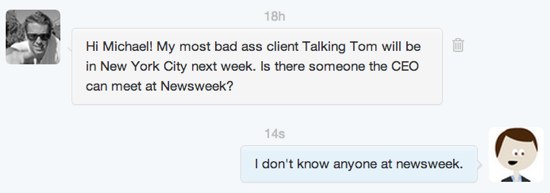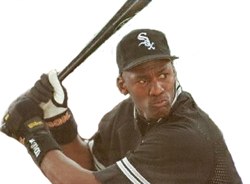 Being in London for Le Web this week brings back fond memories.
Being in London for Le Web this week brings back fond memories.
In 2001 I was living here, working for a startup. I was hired as VP business development, but within a week after arriving in London to take the job I was promoted to acting COO – they guy doing that job had been fired over some resume discrepancy.
I was thrilled to have an exec position that was one step away from the CEO. At the time that was my goal – to become the CEO of a startup and successfully take it public. Being the Decider. Final responsibility for success or failure. Win or lose, at least you were in the arena. Etc. Gladiator stuff.
I was terrible at my job though.
I had little management experience at the time and I was suddenly managing the teams that were building the product and preparing for ops afterwards. It was all on a very tight schedule and I lived and breathed Microsoft Project all day and all night. I was also managing the sales team out trying to get deals done for the launch and the marketing person. And a bunch of other people doing various jobs (HR, etc.).
My weaknesses were glaring:
Stress was eating me up.
I snapped at people pretty regularly. I was (and am) mercurial.
I micromanaged, failed to delegate properly and tried to do people’s jobs for them.
I probably did more harm than good.
etc.
The person running the sales team, a guy named Peter Morgan, became a good friend and I often confided, over pints of surprisingly strong beer, my dream of being a proper CEO someday as well as my knowledge that I lacked a whole host of skills to be that CEO.
I was beating myself up over all my failings as an executive. But beating myself up wasn’t making me any better at my job. It just added to the stress.
One day Peter said something after another one of my whining sessions that changed everything about the way I worked.
He said “Stop worrying about what you’re bad at. Focus on what you’re good at and do more of that. Swim downstream. That’s how you become successful. Play to your strengths.”
I’ve never forgotten that conversation. It still took a few years for it to properly sink in, and during those years I did finally become a CEO. I was lucky enough to have a right hand guy who ran things internally for me, though, so my management weaknesses didn’t hinder things.
I’m glad I was able to be the CEO finally, because I never would have realized that (in addition to the fact that I wasn’t good at it) the job wasn’t all that great anyway. I’ll write more on why being CEO isn’t what it’s cracked up to be in another post.
But I’d finally learned my lesson. There was no way I’d ever fix the personality traits that led me to being a terrible manager. I’d spent too much energy trying to be this perfectly well rounded executive.
Peter’s words came back to me, and I started focusing on doing the things I was actually good at already. Talking to people. Focusing like a laser on a given task until it was done. Researching. Learning. Selling. Communicating.
That’s when TechCrunch was born. When it became more than just me and a couple of others I made the spectacularly brillant decision to hire Heather Harde to be the CEO of the company because she’s great at all the things I suck at (to be fair, she’s also great at all the things I’m good at, too).
That gave me the flexibility to continue to be myself and not have to try to swim upstream all the time. And things worked out pretty well.
There’s an important point here, though. When I say “swim downstream” I don’t mean “take the easy way all the time.” That definitely doesn’t lead to success.
Sometimes you have to be a salmon, which literally swims upstream to get what’s needed done. That means exhausting yourself. Getting clawed at by bears and smashed into rocks, and then dying at the end.
Which sucks. But in the salmon’s case, it’s the way things are. That salmon knows what it has to do, it’s resolute, and it does it. A salmon who never swims upstream never reproduces. That salmon is a loser.
I’m talking about something different. I’m talking about this weird need a lot of us have to ignore the things we’re already good at and focus too much time and energy on being better at things we’re not good at. Not because we’re necessarily interested in those things, but just because we think we’ll somehow be happier or more successful if we fix it.
But sometimes it’s better to just let it go.
A good current example is Jack Dorsey. Dorsey was, say some people, terrible as the CEO of Twitter. But he’s fantastic at being the guy who focuses on product, at both Twitter and Square.
Jack Dorsey shouldn’t spend his time trying to fix whatever personality traits cause him to suck at being a CEO. He’s better off (as are we) if he just focuses on imagining and building new products.
Another example of this is Michael Jordan, who yearned to be a great baseball player. It’s fine that he tried and failed, sometimes you need to scratch an itch. I’m just glad he gave it up after a year and went back to the Bulls. Where he won three more championships. That was probably a lot more fun for him than struggling to play baseball.
There’s tons of nuance here, and caveats. I don’t think this applies to people’s personal lives at all (people who aren’t great parents, for example, should probably not just give up trying). And even at work we sometimes need to spend time doing things we aren’t good at. In general, though, I say stop worrying about what you suck at, and focus on what you’re good at. It’s more fun, and you’ll be happier.
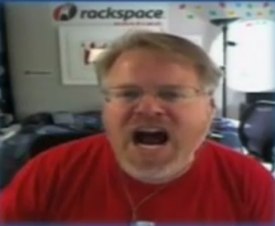 Or, as Scoble says:
Or, as Scoble says: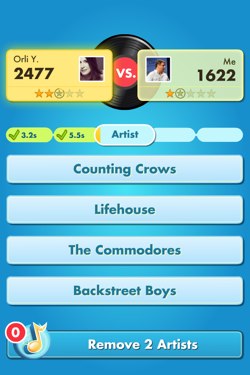
 Being in London for
Being in London for 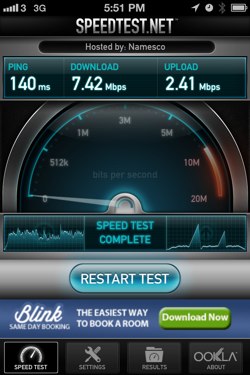 More than just fine, actually. Speedtest shows a 7.42 Mbps download speed from my hotel room. I’d kill for something like that in the U.S.
More than just fine, actually. Speedtest shows a 7.42 Mbps download speed from my hotel room. I’d kill for something like that in the U.S.